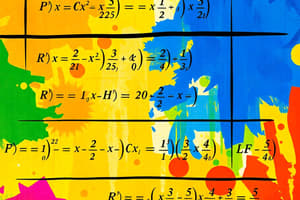Podcast
Questions and Answers
What is the main objective of the Calculus course?
What is the main objective of the Calculus course?
- To train students to work as mathematicians
- To provide students with the fundamental concepts of calculus and problem-solving skills (correct)
- To provide students with a basic understanding of mathematics
- To teach students how to solve engineering problems
What percentage of the total assessment is the continuous assessment?
What percentage of the total assessment is the continuous assessment?
- 50%
- 30%
- 40% (correct)
- 20%
What is one of the skills students should have after completing the Calculus course?
What is one of the skills students should have after completing the Calculus course?
- Ability to apply differentiation to solve maxima and minima problems (correct)
- Ability to solve physics problems
- Ability to teach calculus
- Ability to write calculus software
What is the weightage of the end of semester examination?
What is the weightage of the end of semester examination?
What type of assignments will be given to students?
What type of assignments will be given to students?
What is one of the topics that will be covered in the Calculus course?
What is one of the topics that will be covered in the Calculus course?
What percentage of the continuous assessment is attendance?
What percentage of the continuous assessment is attendance?
What is the derivative of sin x?
What is the derivative of sin x?
What is the derivative of cos ax?
What is the derivative of cos ax?
Who compiled the lecture note?
Who compiled the lecture note?
What is the principal value of arcsin x?
What is the principal value of arcsin x?
What is the derivative of tan x?
What is the derivative of tan x?
What is the derivative of csc x?
What is the derivative of csc x?
What is the derivative of sec x?
What is the derivative of sec x?
What is the concept of velocity in the context of derivatives?
What is the concept of velocity in the context of derivatives?
What is the definition of instantaneous velocity?
What is the definition of instantaneous velocity?
What is the derivative of a function f(x) in geometrical terms?
What is the derivative of a function f(x) in geometrical terms?
What is the concept of the derivative in physical terms?
What is the concept of the derivative in physical terms?
What is the formula for the instantaneous velocity?
What is the formula for the instantaneous velocity?
What is the meaning of the derivative in geometrical terms?
What is the meaning of the derivative in geometrical terms?
What is the definition of the derivative of a function f(x)?
What is the definition of the derivative of a function f(x)?
What is the concept of the derivative in mathematical terms?
What is the concept of the derivative in mathematical terms?
What is the derivative of tan x?
What is the derivative of tan x?
What is the integral of sin x cos x?
What is the integral of sin x cos x?
What is the integral of tan x sec²x?
What is the integral of tan x sec²x?
What is the integral of ln x/x?
What is the integral of ln x/x?
What is the derivative of sec x?
What is the derivative of sec x?
What is the integral of √(1-x²)?
What is the integral of √(1-x²)?
What is the integral of sin x?
What is the integral of sin x?
What is the integral of tan x sec²x?
What is the integral of tan x sec²x?
What is the derivative of 𝑓⁄𝑔 with respect to 𝑥?
What is the derivative of 𝑓⁄𝑔 with respect to 𝑥?
What is the definition of the derivative of ℎ(𝑥) with respect to 𝑥?
What is the definition of the derivative of ℎ(𝑥) with respect to 𝑥?
What is the special case of the derivative of 𝑓⁄𝑔 with respect to 𝑥 when 𝑓(𝑥) = 1?
What is the special case of the derivative of 𝑓⁄𝑔 with respect to 𝑥 when 𝑓(𝑥) = 1?
What is the formula for the derivative of 𝑓⁄𝑔 with respect to 𝑥 in terms of the derivatives of 𝑓 and 𝑔?
What is the formula for the derivative of 𝑓⁄𝑔 with respect to 𝑥 in terms of the derivatives of 𝑓 and 𝑔?
What is the purpose of the limit as ∆𝑥 → 0 in the definition of the derivative?
What is the purpose of the limit as ∆𝑥 → 0 in the definition of the derivative?
What is the chain rule used for?
What is the chain rule used for?
What is the derivative of ℎ(𝑥) = 𝑓(𝑥)⁄𝑔(𝑥) with respect to 𝑥?
What is the derivative of ℎ(𝑥) = 𝑓(𝑥)⁄𝑔(𝑥) with respect to 𝑥?
What is the condition for 𝑓(𝑥) and 𝑔(𝑥) to be differentiable?
What is the condition for 𝑓(𝑥) and 𝑔(𝑥) to be differentiable?
What is the formula for the derivative of 1⁄𝑔(𝑥) with respect to 𝑥?
What is the formula for the derivative of 1⁄𝑔(𝑥) with respect to 𝑥?
What is the purpose of the example in the text?
What is the purpose of the example in the text?
Flashcards are hidden until you start studying
Study Notes
Derivative of a Function
- The derivative of a function 𝑓(𝑥) is the limit of the ratio of the change in the function value to the change in 𝑥, as the change in 𝑥 approaches zero.
- The derivative can be represented as 𝑓′(𝑥) or 𝑑𝑓/𝑑𝑥.
- The derivative of a function can be used to find the rate of change of the function with respect to 𝑥.
Differentiation Rules
- The derivative of a product of functions is the product of their derivatives.
- The derivative of a quotient of functions is the quotient of their derivatives.
- The derivative of a function with a constant coefficient is the coefficient times the derivative of the function.
Geometrical Concept of Derivatives
- The derivative of a function can be represented as the slope of the line tangent to the graph of the function.
- The derivative of a function can be used to find the rate of change of the function with respect to 𝑥.
Physical Concept of Derivatives
- The derivative of a function can be used to find the rate of change of the function with respect to time.
- The derivative of a function can be used to find the velocity of an object.
Derivative of Trigonometric Functions
- The derivative of sin(𝑥) is cos(𝑥).
- The derivative of cos(𝑥) is -sin(𝑥).
- The derivative of tan(𝑥) is sec^2(𝑥).
- The derivative of cot(𝑥) is -csc^2(𝑥).
- The derivative of sec(𝑥) is sec(𝑥)tan(𝑥).
- The derivative of csc(𝑥) is -csc(𝑥)cot(𝑥).
Differentiation of Inverse Trigonometric Functions
- The derivative of arcsin(𝑥) is 1/√(1-𝑥^2).
- The derivative of arccos(𝑥) is -1/√(1-𝑥^2).
- The derivative of arctan(𝑥) is 1/(1+𝑥^2).
- The derivative of arccot(𝑥) is -1/(1+𝑥^2).
- The derivative of arcsec(𝑥) is 1/|𝑥|√(𝑥^2-1).
- The derivative of arccsc(𝑥) is -1/|𝑥|√(𝑥^2-1).
Chain Rule
- The derivative of a composite function is the derivative of the outer function times the derivative of the inner function.
Course Objectives
- Find the derivatives of functions from first principle and using the rules of differentiation.
- Apply differentiation to solve maxima and minima problems.
- Apply differentiation to solve rates of change problems.
- Find the derivatives of logarithmic functions.
- Evaluate integrals using the fundamental theorem of calculus.
- Evaluate integrals using advanced techniques of integration.
- Find the partial derivatives of functions of several variables.
- Solve basic problems in ordinary differential equations.
- Obtain the Laplace transform of simple standard expressions.
- Use the first shift theorem to find the Laplace transform of simple expressions multiplied by an exponent.
- Identify and solve problems involving Gamma and Beta functions.
Assessment
- Continuous assessment (40%) and end-of-semester examination (60%).
- Continuous assessment includes attendance, group assignments, and individual assignments.
Studying That Suits You
Use AI to generate personalized quizzes and flashcards to suit your learning preferences.




